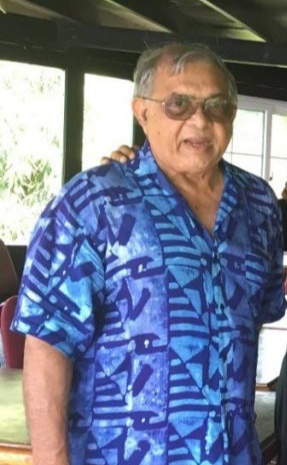Tony Deyal's Was Last Seen : A humorous snapshot of Caribbean culture

More often than not, grim news fills the region’s newspapers, as it does everywhere else in the world. Yet columnist Tony Deyal has defied that norm over the years to make readers smile and even laugh through his columns.
Now, 76 of Deyal’s columns dating from 1993 to 2019 have been collected in a book, Tony Deyal Was Last Seen…Together, Deyal’s columns provide a snapshot of Caribbean culture that focuses on the language and humour of the region as much as it focuses on socio-political issues.
In his introduction, Professor Emeritus Kenneth Ramchand calls Deyal “a humorist of the region” and hails his “storytelling, communication schools, evocation of character and chronic word play”. He describes Deyal as a “connoisseur of chaos and lover of life.”
Deyal’s wry wit, social satire, self-denigrating humour, vivid imagery and off-beat arguments have become his trademark.
In the book’s first column, As Luck would Have It, Deyal targets superstition. Using history, cricket and personal anecdotes, he captures the absurdity of relying on good luck in sports and in life. In Curtains for Christmas, he captures light-hearted holiday nostalgia with vivid imagery.
By the third column, Catching My Grass, Deyal is in full swing with his puns on the many ways to use the word “grass.” Here too, Deyal shows his ability to turn a personal anecdote into a universal point as he writes about his clumsy attempt to cut his own grass. The unspoken message of the piece is that we are all better off allowing experts to do their jobs.
Many columns like Let There Be Light allow readers to trace Deyal’s life through the Caribbean. Talking about his move from Belize to Antigua and his family’s celebration of Christmas (even though they are Hindus) Deyal captures an important aspect of Trinidadian culture: our penchant for recognising and celebrating others’ religions. It is a subtle, but moving tribute to a practice that escapes much of the rest of the world.
This is truly a collection of Caribbean columns, set in Trinidad, Dominica, Jamaica, Barbados, Antigua, Grenada and Guyana; Deyal’s spin connects readers to holidays, cricket, calypso, politics, family and the concept of home for a Caribbean person. He is a master at capturing setting and evoking Caribbean pride. The column At Play in the Field of the Lord, Kensington Oval, serves as an appreciation of Caribbean cricket fields.
Deyal always finds ways to address important topics such as the cost of food. In Cod Have Mercy, he delivers a message about the price of saltfish. He laments that salt is cheap and fish is relatively cheap, yet by the time the two combine and come to the Caribbean as saltfish, it has become more expensive than chicken. In the Parable of Fish, he writes of territorial disputes over flying fish, pointing out that the fish think it is one Caribbean even while disputes drag on over fishing rights between Barbados and TT.
Generally, political commentary tends to be serious and often anger-driven, but Deyal tackles political issues through humour, as demonstrated in Allies or All-Lies, a funny and thought-provoking look at political lies.

In This Pun for Higher, he discusses the art of the pun in an anecdote about a bigamist taxi driver. Deyal’s friend comments that it is a “case of two rites making a wrong.” Deyal’s response is that the “bigamist loved, not wisely, but too well.”
Come Fly With Me, like many of Deyal’s columns, is a fun lesson in English. This time it’s about the nuances of English homophones.
Potentially touchy subjects become cultural food for thought, as in Tings that Make Me Go “Hmmm!” and Alas, Alack and Alappe, which discuss language and accents on a personal and cross-cultural level as Deyal consults his Guyanese wife about communication.
One of the most surprising columns is Searching for Hannah, a serious look at the cultural shock of returning home after years of living abroad: he is returning with his Guyanese wife and Bajan children. As he says, “The sad fact about any homecoming is that you are not the same person and you never return to the same place.”
Deyal devotes much of this column to nostalgic anecdotes, including one about the day Hannah gave him money for a magic show at school. Written in September 2000, it foreshadows the violence that would increasingly define Trinidad.
Deyal’s columns celebrate the uniqueness of the Caribbean and remind readers that when it comes to serious social and political topics, a light touch goes a long way towards making readers consider a point.
As calypsonians have always said, humour is the most difficult form of creativity, and Deyal's humour has made him one of the most consistent syndicated Caribbean columnists.


Comments
"Tony Deyal’s Was Last Seen : A humorous snapshot of Caribbean culture"